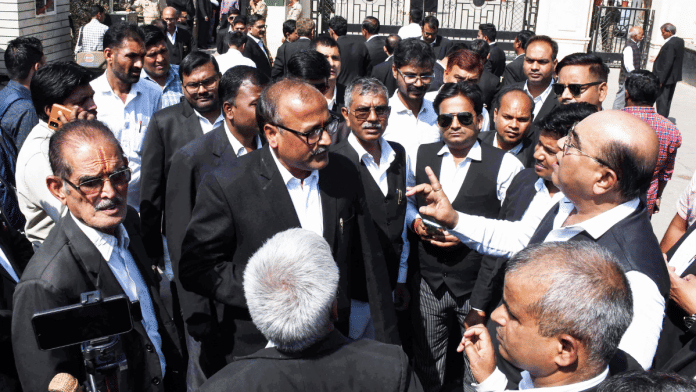Gurugram: The District Bar Association, Gurugram, has restricted non-advocates from entering the district court premises in the professional dress code of the bar—white shirts and black pants, or salwar suits, saris, etc. The move is being seen as an offensive against touts swarming the court complex.
The professional attire is now reserved solely for registered lawyers and authorised law trainees, according to a resolution passed last week by the District Bar Association.
“Only enrolled advocates and bona fide law interns duly authorised and registered with advocates shall be permitted to wear the professional dress code of white shirt and black pant (or salwar suit, sari, etc., as per Bar Council norms) within the court premises,” it states.
Rahul Dhankar, secretary of the association, told ThePrint that the resolution aims to check the activities of tout-like individuals dressed as advocates in the court premises.
“These people wear clothes like lawyers and fool clients by assuring them of legal services and documentation. Once they trap a client, they dupe them of money in the name of fees and later provide services of some little-known lawyers,” he said.
He clarified that the bar’s intention was not to harass the general public but to maintain and protect the dignity of the legal profession.
The bar association has stated that it will coordinate with the court administration and security staff to ensure the enforcement of the dress code resolution. Any violation may be reported for appropriate action and the offender will face a fine of Rs 5,000.
When asked how the bar association would recover this amount, given it lacks such authority, Dhankar explained that they would approach the district and sessions judge and seek the court’s help for this purpose. This measure is intended to deter imposters and reinforce professional discipline in the court complex, he reiterated.
He said that beyond fines, additional legal action may be initiated, including expulsion from the court premises and potential prosecution under relevant laws.
Security staff at entry gates has been given special instructions to verify the identity of registered lawyers and trainee advocates through Bar Council-issued identity cards or other valid certificates.
Amit Rana, Vice-Chairman of the Bar Council of Punjab and Haryana, acknowledged the problem of imposters posing as advocates. However, he said the Council favoured finding alternative solutions rather than banning non-advocates from wearing black pants and white shirts in the court complex.
“Since the Advocates Act, 1961, prescribes the dress code for advocates, which includes black coat, white shirts, and black tie, and several advocates prefer to wear black pants, it becomes confusing when others wear a similar dress. For instance, even staffers in some hotels and banquets wear black pants, white shirts and black ties,” he said.
“This issue has been discussed at our level for quite some time, but we could not find a solution.”
He confirmed that no other bar association in Haryana or Punjab has passed such a resolution except the District Bar Association in Gurugram. He said the Council had advised the Gurugram association to wait for a broader solution, but learned from advocates that the resolution had already been passed last week.
Local advocates welcomed the initiative, calling it a “historic step” to uphold the dignity of the legal profession. They said the rule would curb fraud and ensure clients receive secure, reliable legal services.
“Dress code decorum for advocates is for a reason and anyone trying to misuse this must be punished,” Ritu Bhariok, a senior lawyer practising at the district court in Gurugram, told ThePrint. She asserted that the core objective was to maintain discipline in the court and not to harass anyone.
(Edited by Nida Fatima Siddiqui)
Also Read: What was the points-based system for designating senior advocates & why SC scrapped it






